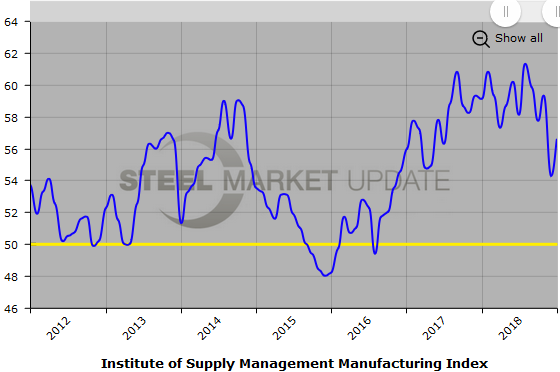Market Data

February 2, 2019
ISM PMI Expands on New Orders
Written by Sandy Williams
The manufacturing sector expanded in January following a weak December, according to the latest survey of purchasing managers by the Institute for Supply Management. ISM’s January PMI rose 2.3 points to 56.6 with new orders, production and inventories growing at a faster rate last month. A reading above 50 indicates growth.
New Orders led the PMI sub-indexes, growing 6.9 points to 58.2. The production index jumped 6.4 points for the strongest growth since September 2018. Backlogs grew slightly from December.
Improved supplier deliveries helped raw material inventories expand at a faster rate in January, but customer inventories were considered too low for the 28th consecutive month.
The prices index registered a decrease of 5.3 points for a reading of 49.6.
“Prices contracted for the first time since February 2016 when the index registered 38.3 points. The Business Survey Committee noted a mix of increases and decreases,” said Timothy R. Fiore, chairman of ISM’s Management Manufacturing Business Survey Committee. “This reflects price turbulence, especially in the steel markets. However, steel prices have generally returned to more normal, pre-tariff levels, including for products manufactured primarily from steel, like mechanical components and fabricated metal products.”
The index for new export orders fell one point to 51.8 in January, contracting for the first time since February 2016. The imports index gained 1.1 percentage points to register 53.8 for the month.
“Imports expansion improved, reversing a three-month expansion decline, in part due to continued activity to import prior to the Lunar New Year, as well as the potential for increased tariffs on March 1,” said Fiore.
Comments from survey panelists included:
- “Overall, business continues to be good; however, margins are being squeezed.” (Transportation Equipment)
- “We continue to enjoy the benefits of a strong general economy. We are busy and maintain a backlog of sales orders.” (Machinery)
- “Business conditions are good, and our demand and production are tracking to our forecasted growth levels for the year.” (Miscellaneous Manufacturing)
- “Going to be a very strong spring. Business levels will be just as good [compared to] the same time frame in 2018.” (Fabricated Metal Products)
- “Steel tariffs continue to put upward pressure on prices of downstream materials.” (Petroleum & Coal Products)
- “Steady supply and production environment.” (Computer & Electronic Products)
- “Concerns about oil prices are fueling questions of how strong the economy will be in the first half of 2019.” (Chemical Products)
Below is a graph showing the history of the ISM Index. You will need to view the graph on our website to use its interactive features; you can do so by clicking here. If you need assistance logging in to or navigating the website, please contact us at info@SteelMarketUpdate.com.








